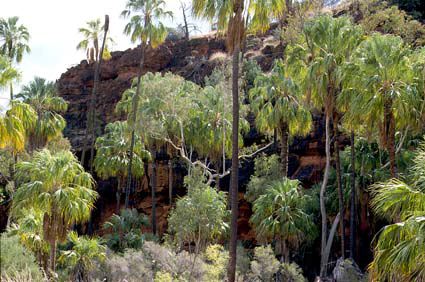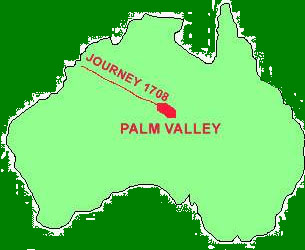
 |
Return to VOC Historical Society home page
In 1834 an English newspaper (Leeds Mercury) reported that a secret English expedition had set off from the north coast of Australia heading southward towards Central Australia in 1832. It said that explorers found there a small colony descended from Dutchmen shipwrecked on Australia’s west coast in the early eighteenth century.
True or a "traveler's tale"? Help us to find out!

|
When you visit Palm Valley in Central Australia, you encounter an oasis in a beautiful setting with its centre piece the Finke River, flanked by native palms and greenery. The area is another example of the many facets the Australian bush can present. Nearby is Hermannsburg, where European missionaries were in contact with aborigines. It is hard to imagine therefore that such a peaceful place may have been the scene of harsh colonial conquest as we have had many throughout Australia's history. It was here that an English expedition came upon a "white tribe". This is, in part, what was reported in the Leeds Mercury ... |

|
"......May 15th, 1832. On reaching the summit of the hill, no words can express the astonishment, delight and wonder I felt at the magical change of scenery, after having traveled for so many days over nothing but barren hills and rocks, and sands and parching plains, without seeing a single tribe of aborigines excepting those on the sea coast and having to dig for water every day. Looking to the southwards I saw below me at the distance of about three or four miles, a low and level country, laid out as it were in plantations, with straight rows of trees, through which a broad sheet of smooth water extended in nearly a direct line from east to west, as far as the eye could reach to the westward, but apparently sweeping to the southward at its eastern extremity like a river; and near its banks, at one particular spot on the south side there appeared to be a group of habitations embossomed in a grove of tall trees like palms. |
|
"... and what fixed me to the spot with indescribable sensations of rapture and admiration was the number of small boats or canoes with one or two persons in each gliding along the narrow channels [sic] between the islands in every direction, some of which appeared to be fishing or drawing nets." |
|
The water I guessed to be about half a mile wide, and although the stream was clearly open for two thirds of the distance from the southern bank, the remainder of it was studded by thousands of little islands stretching along its northern shores: and what fixed me to the spot with indescribable sensations of rapture and admiration was the number of small boats or canoes with one or two persons in each gliding along the narrow channels [sic] between the islands in every direction, some of which appeared to be fishing or drawing nets. None of them had a sail, but one was floating down the body of the stream without wind, which seemed to denote a current ran from east to west. |

|
|
It seemed as if enchantment had brought me to a civilised country, and I could scarcely resolve to leave the spot I stood upon, had it not been for the overpowering rays of a mid day sun affecting my bowels, as it frequently had done, during all the journey. On reaching the bottom of the hill in my return to our party at the tents, I was just turning round a low rock, when I came suddenly upon a human being whose face was so fair and dress so white, that I was for a moment staggered with terror, and thought I was looking at an apparition. I had naturally expected to meet an Indian as black or as brown as the rest of the natives, and not a white man in these unexplored regions. "It was a considerable time before he recovered and was assured of my mortality; and from a few expressions in old Dutch, which he uttered I was luckily enabled to hold some conversation with him; ..." Still quaking with doubts about
the integrity of my eyes I proceeded on, and saw the apparition advancing upon me with the most
perfect indifference: in another minute he was quite near, and I now perceived that he had not
yet seen me, for he was walking slowly and pensively with his eyes fixed on the ground and he
appeared to be a young man of handsome and interesting countenance. We were got within four
paces of each other when he heaved a deep and tremulous sigh, raised his eyes, and in an instant
uttered a loud exclamation and fell insensible to the ground. My fears had now given place to
sympathy, and I hastened to assist the unknown, who I felt convinced, had been struck with the
idea of seeing a supernatural being. It was a considerable time before he recovered and was
assured of my mortality; and from a few expressions in old Dutch, which he uttered I was
luckily enabled to hold some conversation with him; for I had been at school in Holland in my
youth and had not quite forgotten the language.
" .. I gathered from
him a few particulars of a most extraordinary nature; namely, that he belonged to a small
community, all as white as himself, he said about three hundred; that they lived in houses
enclosed all together within a great wall to defend them from black men; that their fathers came
there about one hundred and seventy years ago, as they said, from a distant land across the
great sea; and that their ship broke, ..."
|
|
Badly as he spoke Dutch, yet I gathered from him a few particulars of a most extraordinary nature; namely, that he belonged to a small community, all as white as himself, he said about three hundred; that they lived in houses enclosed all together within a great wall to defend them from black men; that their fathers came there about one hundred and seventy years ago, as they said, from a distant land across the great sea; and that their ship broke, and eighty men and ten of their sisters (female passengers?) with many things were saved on shore. I prevailed on him to accompany me to my party, who I knew would be glad to be introduced to his friends before we set out on our return to our ship at Port Raffles, from which place we were now distant nearly five hundred miles, and our time was linked to a fixed period so as to enable the ship to carry us back to Singapore before the change of the monsoons. |
|
|
"Their traditional history is, that their fathers were compelled by famine, after the loss of their great vessel, to travel towards the rising sun, carrying with them as much of the stores as they could...." The young man's dress consisted of a round jacket and large breeches, both made of skins, divested of the hair and bleached as white as linen; and on his head he wore a tall white skin cap with a brim covered over with white down or the small feathers of the white cockatoo. |

|
A subsequent part of the journal states further: That on our party visiting the white village, the joy of the simple inhabitants was quite extravagant. The descendant of an officer is looked up to as chief, and with him (whose name is Van Baerle,) the party remained eight days. Their traditional history is, that their fathers were compelled by famine, after the loss of their great vessel, to travel towards the rising sun, carrying with them as much of the stores as they could during which many died; and by the wise advice of their ten sisters they crossed a ridge of land, and meeting with a rivulet on the other side, followed its course and were led to the spot they now inhabit, where they have continued ever since. They have no animals of the domestic kind, either cows, sheep, pigs or anything else: |
|
Their plantations consist only of maize and yams, and these with fresh and dried fish constitute their principal food which is changed occasionally for Kangaroo and other game; but it appears that they frequently experience a scarcity and shortage of provisions, most probably owing to ignorance and mismanagement; and had little or nothing to offer us now except skins. They are nominal Christians: their marriages are performed without any ceremony: and all the elders sit in council to manage their affairs; all the young, from ten up to a certain age are considered a standing militia, and are armed with long pikes; they have no books or paper, nor any schools; they retain a certain observance of the Sabbath by refraining from their daily labours, and perform a short superstitious ceremony on that day all together; and they may be considered almost a new race of beings." Source: Tarnished Heroes, Les Hiddens, Publisher: ABC Books, Australian Broadcasting Corporation, GPO Box 9994, Sydney NSW 2001. ISBN 0 7333 0613 6 |
This is how, in part, this event was first reported. You make up your own mind. Let us know what you think.
|
The event is unknown in Australian history and has not been investigated, other than by Les Hiddens (Bush Tucker Man) in recent times.
It was not as if no one knew, for part of the article appeared in the Perth
Gazette in 1837. Is it true or is it a "traveler's tale"?
The story raises a lot of questions for which we
need anwers. So WE need YOUR help in researching it.
|
|
For more information, contact the President of the Society. |
Contact the Secretary of the Society. | Please email any queries, comments or suggestions you may have about this page or event. |